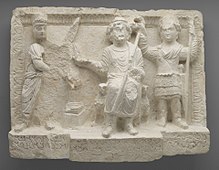Gad (deity): Difference between revisions
m Reverted edits by 2601:380:C101:F300:30C4:2A31:D697:9F7B (talk) (HG) (3.4.9) |
add ref and detail |
||
| Line 2: | Line 2: | ||
[[File:Cult relief of the Gad (Fortune) of Dura, from the Temple of the Gadde.jpg|thumb|Relief from the [[Temple of the Gadde]], [[Dura-Europos]] depicting the god "Gad" of Dura (center), king [[Seleucus I Nicator]] (right) and Hairan son of Maliko son of Nasor (left).{{sfn|Kropp|2013|p= [https://books.google.com/books?id=fsoipziOWpYC&pg=PA225 225]}}]] |
[[File:Cult relief of the Gad (Fortune) of Dura, from the Temple of the Gadde.jpg|thumb|Relief from the [[Temple of the Gadde]], [[Dura-Europos]] depicting the god "Gad" of Dura (center), king [[Seleucus I Nicator]] (right) and Hairan son of Maliko son of Nasor (left).{{sfn|Kropp|2013|p= [https://books.google.com/books?id=fsoipziOWpYC&pg=PA225 225]}}]] |
||
'''Gad''' was the name of the pan-[[Ancient Semitic religion|Semitic]] [[deity|god]] of fortune, and is attested in ancient records of [[Aram (biblical region)|Aram]] and [[Arabia]]. Gad is also mentioned by the [[Book of Isaiah]] (Isaiah 65:11 - some translations simply call him (the god of) Fortune), as having been worshipped by a number of Hebrews during the [[babylonian captivity]]. Gad apparently differed from the god of [[destiny]], who was known as [[Meni (deity)|Meni]]. The [[root]] verb in ''Gad'' means ''cut'' or ''divide'', and from this comes the idea of fate being ''meted out''.{{sfn|van der Toorn|Becking|Willem van der Horst|1999|page=339}} |
'''Gad''' was the name of the pan-[[Ancient Semitic religion|Semitic]] [[deity|god]] of fortune, usually depicted as a male but sometimes as a female.<ref name="GutschowWeiler2014">{{cite book|author1=Niels Gutschow|author2=Katharina Weiler|title=Spirits in Transcultural Skies: Auspicious and Protective Spirits in Artefacts and Architecture Between East and West|url=https://books.google.com/books?id=9_ObBQAAQBAJ&pg=PA14|date=26 November 2014|publisher=Springer|isbn=978-3-319-11632-7|pages=14–}}</ref> and is attested in ancient records of [[Aram (biblical region)|Aram]] and [[Arabia]]. Gad is also mentioned by the [[Book of Isaiah]] (Isaiah 65:11 - some translations simply call him (the god of) Fortune), as having been worshipped by a number of Hebrews during the [[babylonian captivity]]. Gad apparently differed from the god of [[destiny]], who was known as [[Meni (deity)|Meni]]. The [[root]] verb in ''Gad'' means ''cut'' or ''divide'', and from this comes the idea of fate being ''meted out''.{{sfn|van der Toorn|Becking|Willem van der Horst|1999|page=339}} |
||
It is possible that [[Gad (son of Jacob)|the son of Jacob named ''Gad'']] is named after Gad, although the text presents a different reason, the ([[ketub]]) quotation of [[Zilpa]] (Gad's mother) giving the reason of Gad's name could be understood that way. |
It is possible that [[Gad (son of Jacob)|the son of Jacob named ''Gad'']] is named after Gad, although the text presents a different reason, the ([[ketub]]) quotation of [[Zilpa]] (Gad's mother) giving the reason of Gad's name could be understood that way. |
||
Revision as of 07:32, 25 March 2020
This article needs additional citations for verification. (June 2015) |

Gad was the name of the pan-Semitic god of fortune, usually depicted as a male but sometimes as a female.[2] and is attested in ancient records of Aram and Arabia. Gad is also mentioned by the Book of Isaiah (Isaiah 65:11 - some translations simply call him (the god of) Fortune), as having been worshipped by a number of Hebrews during the babylonian captivity. Gad apparently differed from the god of destiny, who was known as Meni. The root verb in Gad means cut or divide, and from this comes the idea of fate being meted out.[3]
It is possible that the son of Jacob named Gad is named after Gad, although the text presents a different reason, the (ketub) quotation of Zilpa (Gad's mother) giving the reason of Gad's name could be understood that way.
How widespread the cult of Gad, the deity, was in Canaanite times may be inferred from the names Baalgad, a city at the foot of Mount Hermon, and Migdal-gad, in the territory of Judah. Compare also the proper names Gaddi and Gaddiel in the tribes of Manasseh and Zebulun (Numbers 13:10, 11). At the same time it must not be supposed that Gad was always regarded as an independent deity. The name was doubtless originally an appellative, meaning the power that allots. Hence any of the greater gods supposed to favour men might be thought of as the giver of good fortune and be worshiped under that title; it is possible that Jupiter, the planet, may have been the Gad thus honoured - among the Arabs the planet Jupiter was called the greater Fortune (Venus was styled the lesser Fortune).
Gad is the patron of a locality, a mountain (Kodashim, tractate Hullin 40a), of an idol (Genesis Rabbah, lxiv), a house, or the world (Genesis Rabbah, lxxi.). Hence "luck" may also be bad (Ecclesiastes Rabbah, vii. 26). A couch or bed for this god of fortune is referred to in the Mishnaic tractate Nedarim 56a).
Citations
- ^ Kropp 2013, p. 225.
- ^ Niels Gutschow; Katharina Weiler (26 November 2014). Spirits in Transcultural Skies: Auspicious and Protective Spirits in Artefacts and Architecture Between East and West. Springer. pp. 14–. ISBN 978-3-319-11632-7.
- ^ van der Toorn, Becking & Willem van der Horst 1999, p. 339.
Sources
- van der Toorn, Karel; Becking, Bob; Willem van der Horst, Pieter (1999). Dictionary of Deities and Demons in the Bible. Wm. B. Eerdmans Publishing. ISBN 9780802824912.
{{cite book}}: Invalid|ref=harv(help)
 This article incorporates text from a publication now in the public domain: Singer, Isidore; et al., eds. (1901–1906). "Gad". The Jewish Encyclopedia. New York: Funk & Wagnalls.
This article incorporates text from a publication now in the public domain: Singer, Isidore; et al., eds. (1901–1906). "Gad". The Jewish Encyclopedia. New York: Funk & Wagnalls.
